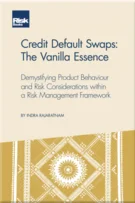Getting organised around operational resilience
Acknowledgements
Abbreviations
Glossary
Foreword by Mike Campbell
Foreword by Raj Sardana
Preface
Introduction
What is operational resilience?
Facets of operational resiliency
Driving business value
How to approach operational resilience
Operational resilience fundamentals
Getting organised around operational resilience
Regulation: Reshaping the financial industry
Understanding impact tolerances: How severe is severe?
Scenario testing: What are severe but plausible scenarios?
Connecting the dots: Resilience, risk and resolution
How resilient are you? The supply chain imperative
Intersection of operational resilience, ESG and climate risk
Artificial intelligence and the transformation of operational resilience
Case study: Covid-19 and the transformational shift in resilience
Closing thoughts: The impact of operational resilience
Appendix: toolkit and guide
Endnotes
References
Based on my experience and observation across the industry, senior leadership is increasingly embracing operational resilience as a core topic in discussions with the board and across the C-suite. This shift underscores the rapid maturation of operational resilience as a multidisciplinary effort. As organisations familiarise themselves with the constituent elements of the operational resilience framework, the inevitable query arises: where does one embark on this journey? Is operational resilience a newfound capability, or even an entirely novel function?
This chapter will examine the organisational structures that support operational resilience programmes, emphasising key principles to ensure effectiveness and alignment with overarching governance frameworks.
The initial stride for any organisation lies in comprehending the purview of operational resilience and subsequently identifying the key stakeholders. This perspective revolves around establishing a centralised function as a starting point, aiming to institute governance, a comprehensive framework, and vigilant oversight.
The centralised function should boast a clearly defined mandate, well-articulated objectives, and explicitly
Copyright Infopro Digital Limited. All rights reserved.
As outlined in our terms and conditions, https://www.infopro-digital.com/terms-and-conditions/subscriptions/ (point 2.4), printing is limited to a single copy.
If you would like to purchase additional rights please email info@risk.net
Copyright Infopro Digital Limited. All rights reserved.
You may share this content using our article tools. As outlined in our terms and conditions, https://www.infopro-digital.com/terms-and-conditions/subscriptions/ (clause 2.4), an Authorised User may only make one copy of the materials for their own personal use. You must also comply with the restrictions in clause 2.5.
If you would like to purchase additional rights please email info@risk.net










